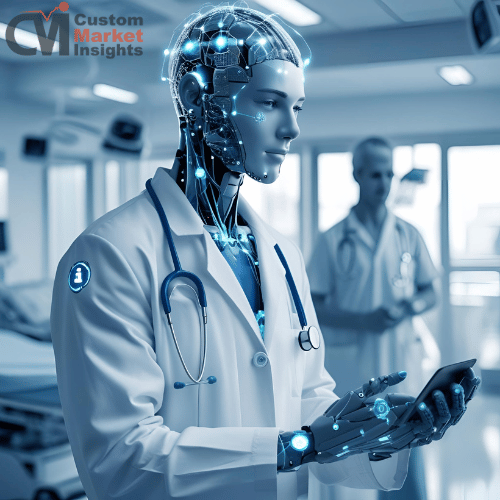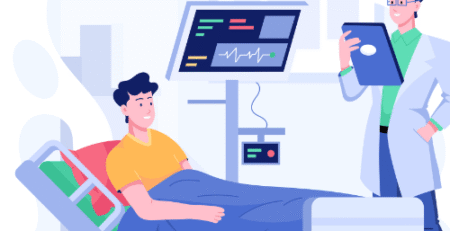The Intersection of Healthcare and Artificial Intelligence
The healthcare industry is going through a big transition, and at the same time, Artificial Intelligence (AI) is making big strides. AI is changing the way medicine is practiced in many ways, including making diagnoses more accurate, speeding up hospital operations, and offering individualized treatment alternatives. AI is no longer just a science fiction idea; it’s here now. This is because patients are becoming worse, there aren’t enough doctors, and data is always getting better.
CMI Market Research says that “the global market for AI in healthcare is expected to grow at a CAGR of 41.7% over the forecast period due to the growing use of digital health, the growing amount of healthcare data, and the growing need for precision medicine.” AI is becoming more and more crucial for not only making therapeutic choices, but also for managing administrative tasks and getting patients involved.
How AI is Revolutionizing Healthcare
AI in healthcare is a broad category that encompasses various applications from machine-learning models that power diagnostic tools to natural-language processing for medical documentation. One of the most groundbreaking areas is medical imaging, with AI algorithms able to spot anomalies, such as tumors, fractures, and lesions more swiftly and, often, more accurately than human radiologists. Technologies such as Google’s DeepMind have shown the promise of AI in diagnosing more than 50 forms of eye disease through the scanning of the retina.
Another important use case is predictive analytics, where healthcare organizations can predict disease outbreaks, patient deterioration, or readmission risk by analyzing historical data. It not only enhances patient care but also saves money.
As it happens, AI-backed chatbots and virtual assistants are making their mark in enhancing the patient experience. They can also schedule appointments, respond to simple health questions, and direct patients on post-op care, without a single human having to lift a finger. Robots help with surgery with the help of AI. As far as robots are concerned, the line between equipment and employee is very blurry; they can even perform some complex tasks that require decision-making with a high degree of accuracy.
Key Differences: Traditional Healthcare vs. AI-Enabled Healthcare
To understand the true value AI brings to healthcare, it’s helpful to compare traditional practices with AI-integrated systems.
| Aspect | Traditional Healthcare | AI-Enabled Healthcare |
| Diagnosis Speed | Time-consuming, often reliant on specialist availability | Instant analysis via AI algorithms using large datasets |
| Treatment Plans | Based on general protocols and physician experience | Personalized, data-driven recommendations |
| Operational Efficiency | Manual administrative tasks, prone to errors | Automated scheduling, billing, and documentation |
| Patient Interaction | Limited to physical visits and manual follow-ups | 24/7 virtual assistants and remote monitoring |
| Data Utilization | Underutilized due to lack of tools | Fully leveraged for predictive analytics and research |
| Surgical Accuracy | Depends on surgeon’s expertise | Enhanced by robotic systems and AI-based guidance |
AI in Personalized Medicine and Genomics
Personalized medicine, which uses a person’s genetics, lifestyle, and medical history to choose the best treatment for them, may be the most exciting new area of AI in healthcare. AI can go through giant volumes of genomic data to uncover biomarkers and suggest the best treatment for a specific patient. This capability is significant for cancer treatment since precision medicine is already helping doctors pick treatments based on the genetic makeup of a tumor.
Startups and big health care companies are spending billions of dollars on drug-discovery platforms that use AI to speed up and lower the cost of making new pharmaceuticals. They use biological data to forecast how chemicals would affect the body, which helps researchers narrow down their list of possible therapeutic possibilities.
Improving Hospital Administration with AI
Although emphasis is typically on clinical application, AI is equally disruptive in healthcare administration. AI algorithms could enable hospitals and doctors’ offices to forecast inflows of patients, better deploy staff members, and optimize supply chains using resource management systems. This results in a tremendous deal of cost avoidance and better care decisions.
Medical documentation is becoming less tedious thanks to AI and NLP, two technologies that focus on information processing. It could transcribe doctor-patient conversations, pull out important information buried in clinical notes, and auto-populate electronic health records (EHRs) so doctors have more time to spend with patients.
Challenges and Ethical Considerations
Artificial intelligence can be great for health care, or maybe it’s just okay. One big concern: the safety and privacy of data. You don’t want your health care data to leak! The Health Insurance Portability and Accountability Act (HIPAA) applies in the U.S., while the General Data Protection Regulation (GDPR) is enforced in the EU. Finally, you need to adhere to various regulations, such as the GDPR in the EU.
Another problem is that AI algorithms can be biased. The Health Insurance Portability and Accountability Act (HIPAA) in the U.S. and the General Data Protection Regulation (GDPR) in the EU are important regulations to consider; however, AI systems can produce biased results that negatively impact minority populations. To remedy this, clear definitions of the algorithms and strict validation are needed, and then there is the human factor: People simply don’t want to believe it. Health care workers may fear that AI will steal their jobs or may not know how to use AI technologies correctly. But the reality is AI does not displace doctors, it only makes them better at what they do.
The Future of AI in Healthcare
Legislation incorporates AI features like integration and scalability. Wearable devices facilitated by AI will transmit patients’ vitals in real-time, alerting care providers in the event of emergencies. AI will help to escalate mental health interventions via sentiment analysis and provide mechanisms for virtual therapy. AI-supported remote patient monitoring has become the norm, particularly in the monitoring of chronic diseases like diabetes, hypertension, and cardiovascular illnesses.
Interconnectivity will be better, with some healthcare systems being able to interface with one another. This will provide a comprehensive view of patients’ health and reduce the likelihood of unnecessary tests and treatments.
Conclusion: Augmenting, Not Replacing
This approach has become the norm, particularly in the monitoring of chronic diseases, making it easier to manage patient care. AI enables health care providers to do what they do best: care for their patients. It does so by eliminating the tedious and complicating the difficult less to comprehend. There’s much work remaining, but there is little doubt that AI can be an asset to making the health care system smarter, more equitable, and more effective.
As the technology continues to improve and reach more people, we can hope for a future where artificial intelligence is not merely a tool but a trusted partner throughout care, from prevention and diagnosis to treatment and recovery.
Connect with our Experts


